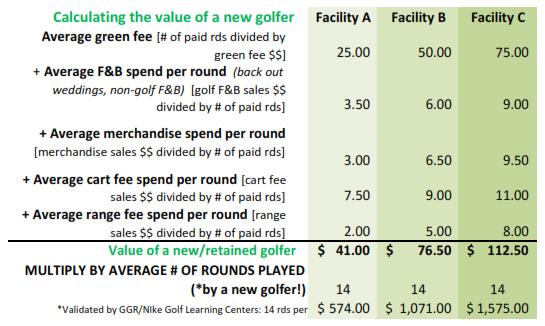I heard an interesting story about a golf professional who was working with one of my colleagues recently. In a discussion about merchandising sales, my colleague, Ian James of RetailTribe, had asked the golf professional (who happened to own his own shop) a very simple question about his gross revenue just from sales of golf gloves.
In a simple calculation, Ian had the professional answer these simple questions, then complete a simple calculation:
- (A) How many gloves did you sell? (B) How many rounds do you have?
- Now divide the number of rounds by the number of gloves sold. [(B / A = # of gloves sold per round)]
As it turns out, the pros shop sold one glove for every six rounds. Pretty good, right? At first, that seemed pretty good to the pro. Then Ian burst his bubble. He asked the pro, “What if you could sell one glove per foursome?”
In response, the pro immediately went back to his calculator, and changed up the calculation. As it turned out, without adding more rounds (about 40k rounds) or raising his glove prices (average about $14 per glove), the increase in gross glove sales would be somewhere between $50,000-$60,000. What do you think this pro did? You’re right, he went directly to his staff to talk about selling more gloves. (Now, I realize there is a cost of goods sold (COGS) to consider, but the point is still worth thinking about.)What funny things might you be missing “on the way to the BOTTOM LINE?”
APPLICATIONS FOR 2015 AND BEYOND
When we consider the concepts in the story above and apply them to the PLAYER DEVELOPMENT MATH (PDM), I believe we’ll find even more “funny things” that will be game changers for those willing to do some simple calculations, and then take action based on their findings. Unlike merchandise and the COGS, rounds of golf have no COGS and they create more opportunity to sell gloves, balls and beers.
If you’re working at a public-access facility, I strongly encourage you to learn your Player Development Math (PDM) principles. It starts with knowing the following answers:
Now, let’s go back to our pro who owned his own golf shop. Remember his reaction when he realized what a little concentrated effort could do to his bottom line (with gloves?)
If he owned the golf course, how do you think “our intrepid PGA professional” would react to this if he knew the value of a new golfer? Let’s say he owns Facility B and his course sells about 40,000 rounds a year.
What if you worked for him and by creating/delivering Get Golf Ready (or similar) programming, were able to create just 40 new golfers by yourself? (To do so, you’d need to sell out five GGR classes, and spend about 8 hours for each class to get all 40 participants through to graduation – in total, 40 or so hours.) If we round down to $1000 per new golfer, you’d be creating $40,000 for your PGA professional owner.
Question 1: If you created $40k in gross revenue in just 40 hours of work, do you think that would be good for you, your job security and your income?
Question 2: If you were able to then double your output or triple it, how would that turn out for you? Would you be able to ‘write your own ticket’ as a producer of rounds (and thus revenue?)
If you work at a private club, I can very easily correlate the value of a new member, or an upgraded membership to your club’s bottom line. In fact, I hope you’ll reach out to me to see how I can help you with your own Player Development Math: Private Club version.
Friends, it’s time to start getting out from behind the counter (or our desk) and start doing the things that truly count (for the bottom line) and put “counting what we’re doing” on the stop-doing list.
With May rolling in, it’s official that our 2015 Season is here (although for some of us, it’s been here since mid-February.) I realize now isn’t the time to start planning new programs, but there is still time to start something. Some of the best programs in our Section started as low-turnout events that our peer professionals believed in and didn’t give up on. Maybe you can be one of those this year?
As a reminder, I’m here to help PNWPGA professionals have better jobs, more job stability and earn more income. To do this, I’m committed to helping you create, market and promote your player development concepts in whatever ways I can. Please reach out to me today to let me know how we can get started.
Monte Koch, Certified PGA Professional/Player Development
Player Development Regional Mgr/Mentor**
PGA of America (Greater Seattle/PacNW PGA Section)
Email: Mkoch@pgahq.com Cell: 206/335-5260
